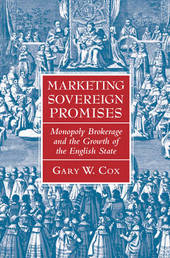
|
Marketing Sovereign Promises: Monopoly Brokerage and the Growth of the English State
Paperback / softback
Main Details
| Title |
Marketing Sovereign Promises: Monopoly Brokerage and the Growth of the English State
|
| Authors and Contributors |
By (author) Gary W. Cox
|
| Series | Political Economy of Institutions and Decisions |
|---|
| Physical Properties |
| Format:Paperback / softback | | Pages:232 | | Dimensions(mm): Height 228,Width 152 |
|
| Category/Genre | British and Irish History
Economic history |
|---|
| ISBN/Barcode |
9781316506097
|
| Classifications | Dewey:942.07 |
|---|
| Audience | | Tertiary Education (US: College) | | Professional & Vocational | |
|---|
| Illustrations |
14 Tables, black and white; 21 Line drawings, unspecified
|
|
Publishing Details |
| Publisher |
Cambridge University Press
|
| Imprint |
Cambridge University Press
|
| Publication Date |
28 April 2016 |
| Publication Country |
United Kingdom
|
Description
How did England, once a minor regional power, become a global hegemon between 1689 and 1815? Why, over the same period, did she become the world's first industrial nation? Gary W. Cox addresses these questions in Marketing Sovereign Promises. The book examines two central issues: the origins of the great taxing power of the modern state and how that power is made compatible with economic growth. Part I considers England's rise after the revolution of 1689, highlighting the establishment of annual budgets with shutdown reversions. This core reform effected a great increase in per capita tax extraction. Part II investigates the regional and global spread of British budgeting ideas. Cox argues that states grew only if they addressed a central credibility problem afflicting the Ancien Regime - that rulers were legally entitled to spend public revenue however they deemed fit.
Author Biography
Gary W. Cox is the William Bennett Munro Professor of Political Science at Stanford University, California. Cox has written numerous articles and is author of The Efficient Secret (winner of the 1983 Samuel H. Beer Dissertation Prize and the 2003 George H. Hallett Award), coauthor of Legislative Leviathan (winner of the 1993 Richard F. Fenno Prize), author of Making Votes Count (winner of the 1998 Woodrow Wilson Foundation Award, the 1998 Luebbert Prize, and the 2007 George H. Hallett Award), and coauthor of Setting the Agenda (winner of the 2006 Leon D. Epstein Book Award). Cox was elected to the American Academy of Arts and Sciences in 1996 and the National Academy of Sciences in 2005.
Reviews'Seventeenth-century British public finance stands at the intersection of several fields of scholarship - economics, political science, and history - and research on it lies at the foundation of contemporary political economy. In this important work, Gary W. Cox revisits the topic and offers an interpretation of his own. The book is pure Cox: deeply researched, closely argued, and profound - political economy done right.' Robert H. Bates, Harvard University, Massachusetts 'This is a major contribution to institutional economics, the application of those methods to understanding British political development, the comparative history of fiscal constitutions, and an interesting extension of arguments about the Industrial Revolution.' Michael Braddick, Sheffield University 'Cox combines attention to history with carefully laid out models of political economy to understand just how England arrived at limited government. This is the most important book in historical political economy in the last decade.' Jean-Laurent Rosenthal, California Institute of Technology 'Cox provides us with an important new analysis of a critical historical episode, the growth of parliamentary responsibility in Britain, its economic consequences, and the diffusion of this practice to other countries. He adds greatly to our understanding of how the modern state came to be.' David Stasavage, New York University 'Summing Up: Recommended. Upper-division undergraduates through faculty.' B. B. Andrew, Choice
|